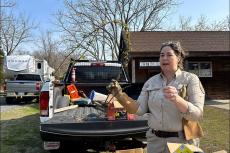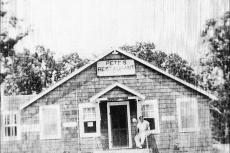The back-and-forth battle over a new mining permit for Sand Land swung in favor of the Noyac mine's opponents last week, with the Appellate Division of the New York State Supreme Court ruling that the Department of Environmental Conservation overstepped its authority in granting more width and more depth for Sand Land in 2019.
Assemblyman Fred W. Thiele Jr. announced this development last Thursday, calling it "a major victory" for the people of the East End.
Wainscott Sand and Gravel operates the Middle Line Highway facility, which has been cited in the past for processing organic vegetative waste onsite. That function was not allowed under a previous iteration of the permit, but in 2019 the D.E.C. awarded an extension of the permit to include mulching in a three-acre area called the "stump dump." The D.E.C.'s 2019 permit also allowed Sand Land to dig 40 feet deeper in the 31 acres that it was previously allowed to mine, and allowed it to process crushed concrete aggregate, crushed stone, and finished compost.
It was almost immediately challenged in court by a group of residents, government officials, environmental organizations, and a local golf course, who were concerned that expanded mining put the region's drinking water at risk. Long Island's drinking water comes from a sole underground aquifer. October 2017 tests by the Suffolk County Department of Health Services reportedly showed the presence of pollutants in water samples taken at the mine, but those results have been questioned because samples taken since then have tested within normal parameters.
Southampton Town building and zoning codes generally do not allow mining, but several longstanding mining operations had been "grandfathered" in as pre-existing, nonconforming uses, with the expectation that expiring permits would not be renewed. According to Mr. Thiele, four out of five judges on the Appellate Court panel found that "where it is unchallenged that the town's laws prohibit zoning, [the] D.E.C. cannot process the application, let alone issue the permit. . . . Therefore, the act of issuing the permits . . . was arbitrary and capricious."
"We're hoping that the town will quickly enforce this ruling," said Elena Loreto, president of the Noyac Civic Council, which was a participant in the lawsuit. "We're happy for the outcome. It affirms what we've been concerned with for years."
On Sept. 3, 2019, a state judge upheld Sand Land's expanded permit, but Mr. Thiele said that last Thursday's Appellate Court ruling annulled it.
"In essence, the D.E.C. broke the law and put the interests of the polluter ahead of the environment and the public. . . . The D.E.C. has failed miserably to protect our groundwater," he said in a statement. "I am grateful that the Appellate Division of the State Supreme Court recognized both the intent of the Legislature to preserve Long Island's valuable groundwater resources and the home rule authority of local government."
Before the extension awarded by the D.E.C. in 2019, Sand Land's previous permit expired in 2018. The mine had been told it must cease its operation and reclaim the land by 2020. But a few months later, in March of 2019, the D.E.C. reversed its position and gave it an eight-year extension, which was initially upheld in State Supreme Court.
Now that its new permit has been annulled, it is unclear exactly how the mine will proceed, and for how long. Sand Land's attorney, Brian E. Matthews, could not be reached for comment.
The D.E.C. said in a statement last Thursday that it is reviewing the decision.
State D.E.C. records show that Sand Land's most recent inspection was on April 22. Dust control, setbacks, spoils, drainage, screening, noise control, and other conditions of the mining operation were all met. "Site in good shape," commented the D.E.C.'s inspectors, Robert Yager and Chris Spies.
This story has been updated since it was first published.




